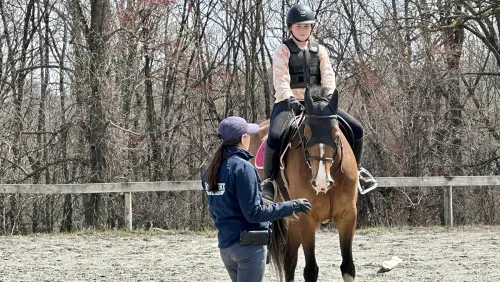Cadeau, my top horse, has weird feet. They’re small and a little upright, and like everything that comes from Europe, he struggled a bit to adjust to the concrete block that is the ground in a Virginia summer. One of the 10 million reasons I use my excellent farrier Sean Crocker is because he believes in the team approach: He listens to my also-excellent sports medicine veterinarian Dr. Cricket Russillo, and he listens to me when I tell him how the horses are going.
So when he said to me, “Sprieser, Cadeau’s feet are making me nervous, and I want to make sure I’m doing the best for him. Can we get a consult in Wellington with one of the best farriers on the planet?” of course I agreed.
I grew up far away from the equestrian centers of our country, finding my love for horses at local barns and then graduating to competing at the national levels. But I left for a reason, and that reason was that international-caliber training and horse management was much harder to find there. Going to college on the East Coast and spending time in elite-level barns there blew my young mind, because I didn’t even know how little I knew.

There’s a learning theory about the “stages of competence” that calls the stage I was in back then “unconscious incompetence.” Everyone begins there, no matter what level of experience they’re surrounded by. The journey one goes on, when one is learning anything—dressage, the tuba, underwater basket-weaving, whatever—then takes you to “conscious incompetence” (you’re starting to appreciate how little you know), “conscious competence” (you know what you know, but you have to think about it), to “unconscious competence” (what you know is just a part of you now, and you don’t have to call it up).
(As an aside, my friend Eliza Sydnor wrote a stellar article about this, and you can read it here.)
Experts develop unconscious competence. That’s what mastery is: having a deep well of knowledge, of pattern recognition, that you don’t have to manually call up. It’s why Sean sounded the alarm about Cadeau’s feet: He’s an expert, and he knew something wasn’t going in the direction he wanted it to go. And then, because he’s also an awesome human, he said, “Hey, let’s get some help.”
Help came in the form of a day with Dr. Russillo and James Gilchrist, one of the best farriers on the planet. Cadeau’s feet—and his whole attitude on life, actually—are going in a whole new direction, and now we all have new skills to continue down this path. Super awesome. All good. But the whole thing gave me a moment of pause, and of gratitude, for being in the place I am, both in my own expertise (the wisdom to use experts at a very high level), but more importantly geographically (having local access to those elite level experts).
ADVERTISEMENT
In my travels, particularly to smaller barns or places farther afield from the equestrian meccas like Wellington, Florida, or Middleburg, Virginia, I see a lot of things that set off my unconscious competence radar. Sometimes I do actually know what’s going wrong. Maybe it’s bad saddle fit, a training approach that isn’t going to end well, or nutrition or management issues resulting in a lack of muscle. But sometimes I just get a tingle, a spidey-sense creep down my spine, that something is Not Right. I have that sense because I’ve logged a lot of mileage involved in high-level, high quality horse care, and I can spot patterns with my unconscious competence.
An unfortunate gift I’ve developed is spotting neurologic problems when they’re still minor. Early-stage neuro horses ride in a very specific way, and I can feel it. I’ve seen so many that not only can I almost always feel it, but I’m getting pretty handy at spotting it, too: I can’t really explain it, but they bear down through the undernecks and brace through their backs in an eerily similar way. It’s a sketchy energy, even when the horse isn’t doing anything naughty or untoward. I can spot it because I’ve seen a lot of them, and then had them diagnosed by a top-level veterinarian, because I have access to that kind of veterinary quality, something that just isn’t true throughout the country.
And again, this isn’t a dig at any one place. There is plenty of bad riding and training in the equestrian hotbeds of our country, just like there can be bad veterinary care and horse management happening down the street from the nation’s best veterinary hospitals or training facilities. There’s good to be found in the far-flung places. But when a place is farther flung, it’s also logistically so much harder to get to. It takes time, money, and lost income opportunities to avail oneself of said far-flung expertise.
I wish for everyone—amateur or professional—to be able to spend at least a week or two in an elite-level program with an open, absorbing, non-defensive mind. Not just to watch and experience the riding and the teaching; watch what the high-performance competitors do for their horse management. See how often they work with farriers and vets and bodyworkers to stay ahead of medical problems. See how they design their horses’ days, weeks and show seasons to promote longevity. See how those elite vets conduct moving exams and approach sports medicine; ask about what the top-level saddle fitters (not just your brand’s local rep) look at when they’re evaluating fit. Absorb, absorb, absorb.
Lauren Sprieser is a USDF gold, silver and bronze medalist with distinction making horses and riders to FEI from her farm in Marshall, Virginia. She’s currently developing The Elvis Syndicate’s C. Cadeau, Clearwater Farm Partners’ Tjornelys Solution, as well as her own string of young horses, with hopes of one day representing the United States in team competition. Follow her on Facebook and Instagram.














